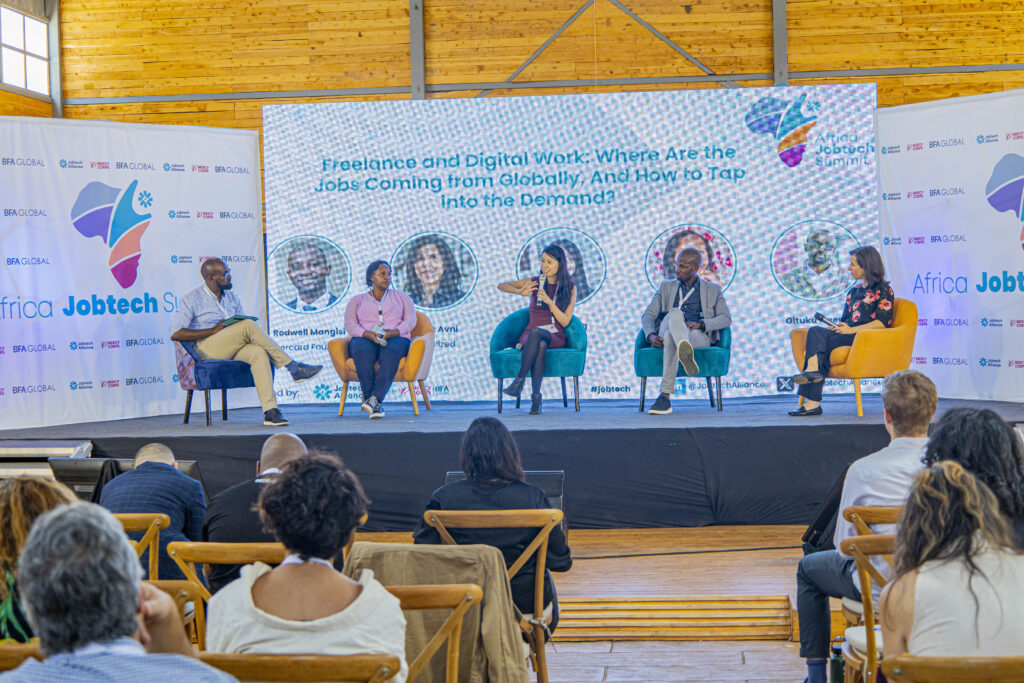By Gituku Ngene
Earlier this year, I had the privilege of leading a panel discussion at the Africa Jobtech Summit, focusing on the evolving landscape of job opportunities for freelancers and digital workers in Africa. The majority of these workers look to the global tech market – especially Silicon Valley – for online-delivered work. Nevertheless, while they pursue this path, the work environment is now changing more rapidly than ever: a formidable new challenger, Artificial Intelligence, is emerging, affecting the traditional job market and at worst, it could snatch away their work.

The recent remarks by NVIDIA’s CEO, suggesting that we need to stop teaching coding due to a potential decline in the demand for software engineers over the next decade due to AI, have sparked widespread debate. While these remarks remain speculative, they sound alarm bells for the African jobtech sector and underscore a pressing need for African workers to reassess their approach to online work in the face of advancing technology. Recent developments where Microsoft’s lay off of 1000 employees was blamed on the AI wave also seem to give credence to the narrative.
Reflecting on our discussions at the summit, I continued mulling the question over whether it’s time to reconsider whether software development should be viewed as the pinnacle of online digital work in Africa. While this field has witnessed significant growth over the last 5 – 10 years – and while pundits continue to point workers to upskill themselves into this higher-skill, higher paying category of work, competing with established markets like India and the Philippines presents a formidable challenge. Getting to their level of expertise and industry organization could take decades. While Africa has gradually developed and exported highly skilled senior developers, it has struggled in recent years to rapidly convert junior and mid-level talent to the required levels. Moreover, the rapid evolution of AI poses additional hurdles – as the industry will likely continue to shift at a much faster rate – and only the most skilled will be able to adapt fast enough. As technology continues to advance, it’s crucial to assess whether Africa can keep pace or risk falling behind.
To play competitively in the market, Africa needs to look at new, niche opportunities in the global market, where it can leapfrog skill development and work delivery to become a market leader. But what might be a sector that Africa could truly own, in the same way that the Philippines has owned the virtual assistants sector?
On my panel, Ronit Avni, the founder and CEO of career platform, Localized, shared a landmark proposal – which caught my attention – on a sector that Africa could own: Carbon and Environmental and Social Governance (ESG). It is a promising growth sector that is poised for rapid scale. With ESG regulation having already taken off in Europe and Asia, and ESG disclosure requirements set to come into effect California in 2026, it is projected that there will be an increased need for ESG compliance among businesses, creating a high demand for expertise around ESG tracking and reporting. In 2021, PwC announced that it would invest $12 billion over five years to create 100,000 new jobs in ESG. In India, young professionals are upskilling themselves through online learning platforms like Coursera, Terra and UpGrad. In fact, Localized is co-launching a Carbon & ESG Analyst course to support training and placement for this skill set in the coming months.
This skillset and experience does not currently exist at scale anywhere in the world yet; why can’t Africa own this space? To build a robust ESG workforce, African workers should build expertise in areas such as sustainability reporting, carbon accounting, ESG risk management, and environmental data analysis. These skills can be developed through specialized training programs and certifications, allowing African workers to service these markets remotely. Moreover, there is a significant opportunity for African jobtech platforms in the outsourcing and remote work space to build out commercial offerings in this vertical, satisfying the ESG tracking and reporting clients for Western clients from Africa.
While ESG is one such area, there could be many more niches where Africa can leapfrog and lead on the global stage. If sector shapers in Africa continue to explore these new opportunities, the continent will not just be playing catch up with the rest of the online digital jobs market, but will have started a path to leapfrogging a new age of digitally delivered work altogether.
The author is Senior Global Advisor – Youth Employment and Innovation, at Mercy Corps

0 Comments